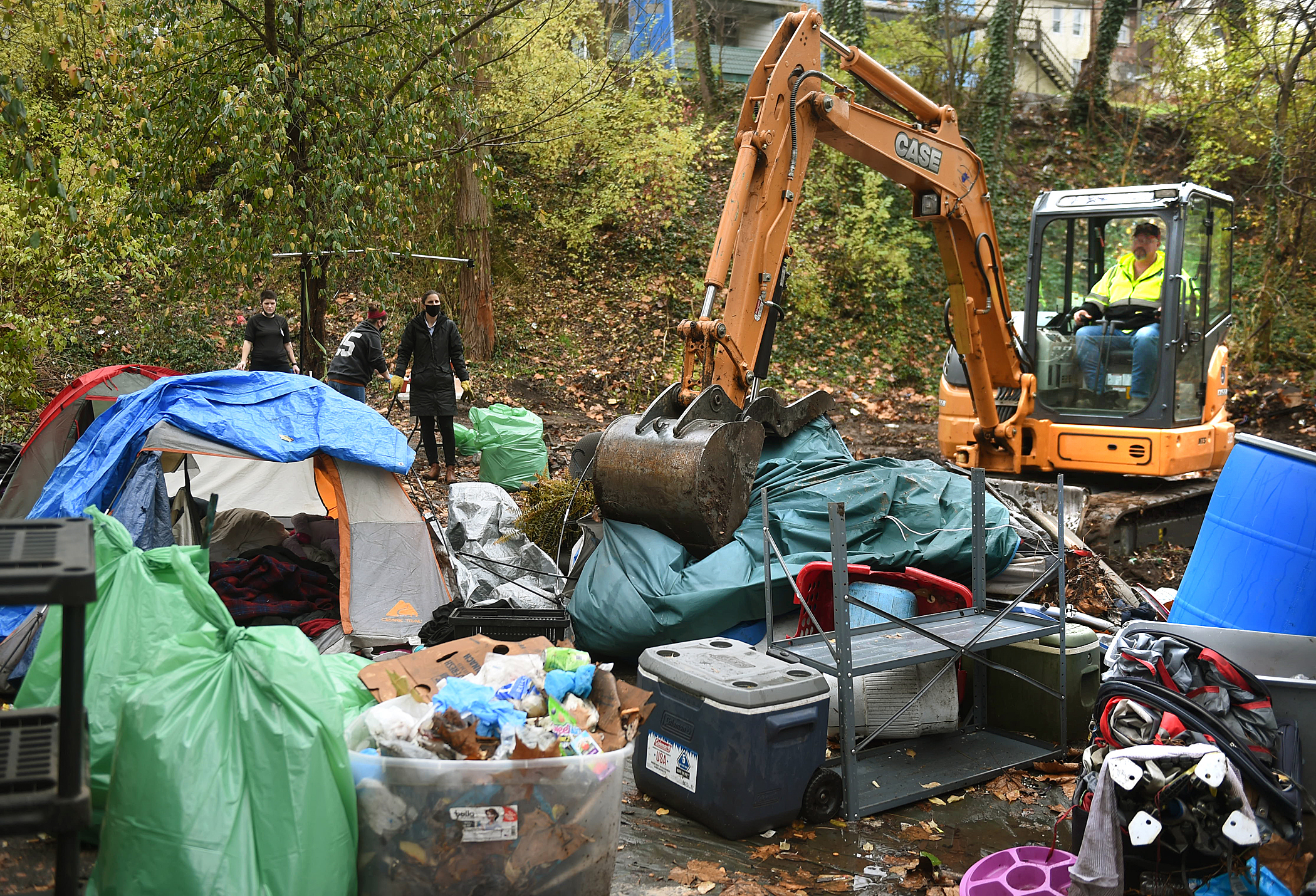MORGANTOWN — If you were in Morgantown during the summer and/or fall of 2020, chances are you’ve heard of Diamond Village.
That was the name given to an encampment of unhoused individuals that began on private property before moving to an adjacent piece of city land in the Greenmont neighborhood.
The camp had a cadre of community members who took up the title “Justice for Diamond Village.” They acted as both public relations and facilitators.
The camp was serviced by various nonprofits and swelled to as many as 30 inhabitants before the Monongalia County Health Department stepped in to force the city’s hand, claiming the location was unsanitary and, in effect, an unlicensed campground being operated with the city’s consent.
Diamond Village is probably the most talked about encampment the city has ever seen.
But it’s not the most influential.
A full year before Diamond Village there was Angel Village.
Videos shared to social media showing city police and work crews tearing the camp down sparked outrage within the community.
Inhabitants claimed birth certificates, identification, social security cards and family keepsakes were lost.
Ultimately, the backlash resulted in the city working with Mountain State Justice to develop a policy on transient/outdoor encampments, which took effect Jan. 1, 2020.
It says, among other things, that the city will provide at least 14 days written notice via signage posted in and around the encampment that it is to be removed.
According to the policy, the city will work with the West Virginia Coalition to End Homelessness to arrange transportation from the site on the day of removal and individuals will be given an additional hour to remove personal property from the site.
Further, General Order 339 states, the WVCEH will be on hand for a “sorting exercise” during which all remaining personal items will be collected by the city and held for a minimum of 14 days.
That’s no longer happening.
The city refutes recent claims that it’s slashing tents and destroying personal property, calling them “unsubstantiated.”
It also refutes claims that there is currently a moratorium on encampment removal, though the MPD “is not currently in the process of removing or dismantling any encampments.”
As for holding on to property removed from camp sites, “The Morgantown Police Department makes substantial efforts to ensure that inhabitants have ample opportunity to gather their personal possessions.”
After consulting with City Attorney Ryan Simonton, Police Chief Eric Powell and MPD social worker Kelly Rice, Morgantown Communications Specialist Hollie Gregory explained further: “When inhabitants are finished gathering their possessions, the City is typically left with biohazardous items that are unsafe to sort through. Unfortunately, storage space is simply not available for the vast number of belongings that are left behind. The Morgantown Police Department tries to offset this by granting inhabitants additional time to gather all their belongings.”
The topic of encampments has once again come to the fore in recent days as advocates of the city’s unhoused have suggested managed camps as an alternative in light of the pending closure of the area’s largest and most established emergency shelter, operated by Bartlett Housing Solutions for nearly 40 years.
The only city property upon which it’s illegal to camp is park property.
In March 2023, the city responded to an article in The Dominion Post stating as much by saying “The city has regulations in place that prohibit camping in parks without a permit. Due to the lack of open space, camping in the city is not permitted.”
The city did not respond to requests for clarification as far as the law prohibiting camping outside of park property, but seem to be alluding to Section 509.01(f) which states individuals will be guilty of disorderly conduct if their presence “Hinders or prevents the movement of persons or vehicles on a public street, road, highway right-of-way or to, from, within or upon public or private property, so as to interfere with the rights of others, by any act which serves no lawful and reasonable purpose.”
How municipalities respond to issues relating to their unhoused populations is often a no-win situation in terms of public perception, if not in the courts.
In January, the city of Wheeling opted to move forward with the enforcement of legislation outlawing homeless encampments. The move drew the ire of dozens of state and national organizations.
The city gave individuals living at an established camp near the Catholic Charities Neighborhood Center until this past Wednesday to move to a new encampment, on city property and exempted from the newly established law.
Traditionally, the courts have not been favorable to political entities that penalize homelessness.
Robert Martin v. City of Boise was filed in 2009 after homeless residents in Boise, Idaho were fined or arrested for sleeping or camping in public.
In 2018, a panel of judges from the 9th U.S. Circuit Court of Appeals said Boise’s laws punishing homeless residents for sleeping in public violated the 8th Amendment’s protections against cruel and unusual punishment because there were not adequate services available to provide an alternative.
A year later, that decision was appealed to the United States Supreme Court, which chose not to take up the case.




